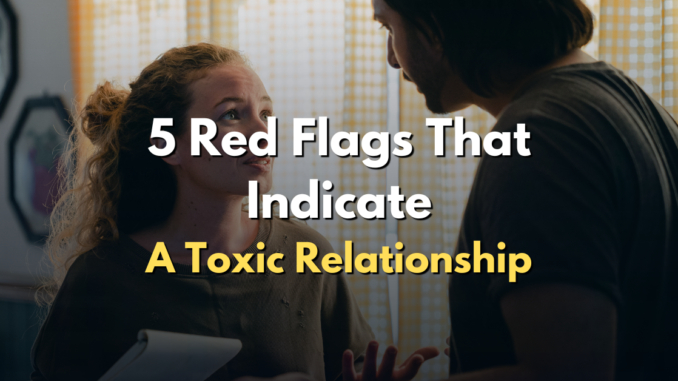
Recognizing the signs of a toxic relationship is crucial for maintaining mental and emotional well-being. Here, we will discuss five red flags that indicate a relationship might be unhealthy and potentially harmful.
1. Lack of Trust
Trust is the absolute foundation of any healthy relationship. When trust is absent, it can lead to a host of issues which erode the connection between partners.
Constant Suspicion: If one partner is always suspicious of the other’s actions, it creates a tense and uncomfortable environment. This can manifest as excessive questioning, checking each other’s phones or social media accounts, and a general sense of paranoia.
Jealousy: Everyone gets jealous at some point, we are humans after all. While a small amount of jealousy can be normal, constant or irrational jealousy is a red flag. It often leads to controlling behaviors where one partner tries to limit the other’s interactions with friends, colleagues, or even family members.
Controlling Behavior: A partner who attempts to control every aspect of your life, from your social interactions to your personal choices, is displaying a severe lack of trust. This control can be subtle, such as making passive-aggressive comments about your activities, or overt, like issuing ultimatums about who you can see and where you can go.
Lack of Respect: Trust and respect go hand-in-hand. Without mutual respect, a relationship cannot thrive. Disrespect can be shown through dismissive attitudes, belittling comments, and an overall disregard for your partner’s feelings and opinions.
2. Constant Criticism or Disrespect
A healthy relationship is built on mutual respect and support. Constant criticism or disrespect can severely damage self-esteem and the overall health of the relationship.
Frequent Criticism: Constructive criticism is essential for growth, but constant, unwarranted criticism can be damaging. It often comes in the form of belittling remarks about your appearance, intelligence, or abilities, making you feel inadequate and unworthy.
Belittling Behavior: This involves putting down your partner in both private and public settings. Belittling can include sarcasm, mocking, or making derogatory jokes at your partner’s expense, interrupting them while they are talking to a group of people, all of which contribute to a toxic atmosphere.
Disrespectful Behavior: Disrespect in a relationship can arise in various ways, including ignoring your partner’s needs, interrupting them, or failing to consider their feelings. This behavior undermines the foundation of mutual respect and appreciation necessary for a healthy partnership.
Eroding Self-Esteem: Over time, constant criticism and disrespect can lead to a significant decline in self-esteem. When your partner makes you feel worthless or inadequate, it can impact your mental health and overall well-being.
Follow the Dnyan Power: Inspired Life channel on WhatsApp to get regular updates and read insightful articles everyday!
3. Isolation from Others
Isolation is a common tactic used by controlling partners to exert power and maintain control over their significant other.
Limiting Social Interactions: A partner who tries to isolate you from friends, family, or support networks may be attempting to control and manipulate you. They might make excuses to prevent you from seeing others or express jealousy and anger when you do.
Creating Dependency: By isolating you, a toxic partner creates a sense of dependency where you feel you have no one else to turn to. This can make it challenging to leave the relationship, as you may feel disconnected from your support system.
Undermining Relationships: A toxic partner might also undermine your other relationships by spreading lies, creating conflicts, or making you doubt the loyalty and intentions of your friends and family.
Emotional Manipulation: Isolation is often paired with emotional manipulation, where the toxic partner convinces you that they are the only one who truly cares about you, further deepening your dependency on them.

4. Emotional or Physical Abuse
Abuse, whether emotional, verbal, or physical, is a clear indicator of a toxic relationship. No one should tolerate any form of abuse.
Emotional Abuse: Emotional abuse can be subtle but damaging. It includes behaviors like gaslighting, where the abuser makes you doubt your reality and feelings, and constant manipulation to control your emotions and actions.
Verbal Abuse: Verbal abuse involves using words to hurt, belittle, or control your partner. This can include yelling, insults, name-calling, and threats, all of which can have a devastating impact on your mental health.
Physical Abuse: Physical abuse is the most apparent form of abuse and includes any form of physical harm or threat of harm. This can range from pushing, hitting, or choking to more severe acts of violence. Physical abuse is a severe red flag that requires immediate intervention and support.
Impact on Mental Health: Any form of abuse can lead to severe mental health issues, including anxiety, depression, and post-traumatic stress disorder (PTSD). It is crucial to seek help if you find yourself in an abusive relationship.
Also Read: 444+ Helpful Affirmations for Everyday
5. Lack of Personal Growth
A healthy relationship should support and encourage individual growth and personal development. Feeling stagnant or unable to pursue your interests is a sign of a toxic dynamic.
Stagnation: If you feel stuck and unable to grow within your relationship, it may be a sign that your partner is not supportive of your personal goals and aspirations. This can lead to a sense of dissatisfaction and frustration.
Discouraging Ambitions: A toxic partner may discourage your ambitions and goals, either by belittling your dreams or actively preventing you from pursuing them. This lack of support can become a hurdle in your personal and professional development.
Suppressing Interests: Being in a relationship should not mean giving up your interests and hobbies. If your partner discourages or forbids you from engaging in activities you love, it can lead to a loss of identity and self-worth.
Autonomy: A healthy relationship allows both partners to maintain a sense of autonomy and individuality. If you feel like you cannot be yourself or pursue your interests, it indicates a lack of respect and support from your partner.
Conclusion
Recognizing these red flags is the first step toward addressing the issues and protecting your well-being. Lack of trust, constant criticism or disrespect, isolation from others, emotional or physical abuse, and lack of personal growth are all indicators of a toxic relationship. It’s essential to prioritize your mental and emotional health by seeking support from friends, family, or professionals. Remember, a healthy relationship is built on trust, respect, and mutual support, and you deserve nothing less.
Content on this blog, including text, some images, and other creative works, is the intellectual property of Dnyan Power and is protected by copyright law. Unauthorized use or reproduction of any content without prior written permission is strictly prohibited. For inquiries or permissions, please Contact Us or email us at quantumhypnosisplr@gmail.com

About Author
Shivangi Javkar
Mental Health Counselor, Digital Creator & Social Media Marketer at Quantum Holistic Health
+91 7400473893

Leave a Reply